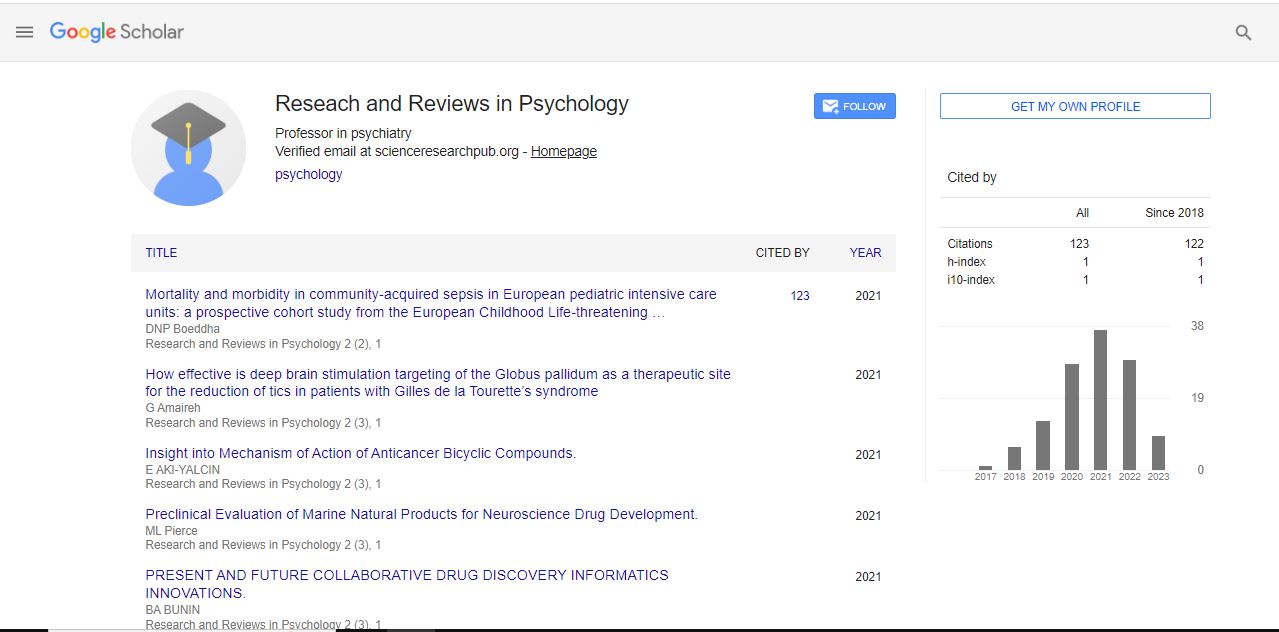Perspective, Res Rev Phys Vol: 4 Issue: 3
Biological Psychology: Principles, Applications and Future Trends
Schumann Kacel*
1Department of Psychiatry, University of Mayo Clinic, Rochester, USA
*Corresponding Author: Schumann Kacel,
Department of Psychiatry, University
of Mayo Clinic, Rochester, USA
E-mail: kacel.s@gmail.com
Received date: 02 September, 2023, Manuscript No. RRPY-23-117738;
Editor assigned date: 04 September, 2023, PreQC No. RRPY-23-117738 (PQ);
Reviewed date: 18 September, 2023, QC No. RRPY-23-117738;
Revised date: 25 September, 2023, Manuscript No. RRPY-23-117738 (R);
Published date: 05 October, 2023 DOI: 10.4172/rrpy.1000346.
Citation: Kacel S (2023) Biological Psychology: Principles, Applications and Future Trends. Res Rev Phys 4:3.
Description
Biological psychology, also known as biopsychology or psychobiology, it is a numerous fields that aims to interpret the complicated relationship between the biological processes of the brain and the complexities of human behavior and mental processes. Biological psychology is a branch of psychology that explores how the nervous system, particularly the brain, influences behavior, cognition, and emotions. It delves into the biological mechanisms that underlie various mental processes and behaviors, from the individual neuronal activity to the complex interactions of brain regions.
Principles of biological psychology
Biological psychology operates on several fundamental principles:
Neurobiology: It explores the structure and function of the nervous system, with particular emphasis on the brain.
Genetics: Genetic factors play a significant role in determining an individual's susceptibility to various psychological disorders and cognitive traits.
Hormones and neurotransmitters: Biological psychologists investigate the role of neurotransmitters (e.g., serotonin, dopamine) and hormones (e.g., cortisol, adrenaline) in regulating mood, behavior, and cognition.
Brain-behavior relationships: The field aims to understand how changes in the brain's structure and function are connected to specific behaviors and cognitive processes.
Neural plasticity: Biological psychology recognizes the brain's ability to adapt and it should reconnect, it is known as neural plasticity. This capacity is essential for learning, recovery from injuries, and rehabilitation.
Applications of biological psychology
Biological psychology has wide range of practical applications in various domains:
Clinical psychology: Understanding the biological foundations of mental disorders is essential for the development of effective treatments. Biological psychology contributes to the diagnosis and management of conditions such as schizophrenia, depression, and anxiety disorders.
Neurological rehabilitation: Biological psychology is instrumental in designing rehabilitation programs for individuals with neurological injuries, such as traumatic brain injuries or strokes. Understanding neural plasticity and recovery mechanisms guides therapy.
Pharmacology and drug development: The study of neurotransmitters and their role in mental health has result in the development of psychiatric medications. Biological psychology informs the design of pharmaceutical interventions.
Neuropsychological assessment: Neuropsychological assessments, which evaluate cognitive and behavioral functioning, depend on the understanding of brain-behavior directions. These assessments help to diagnose and manage various conditions.
Biological markers: Biological psychology explores the use of biological markers, such as biomarkers in blood or brain imaging, to detect and monitor conditions such as Alzheimer's disease, Parkinson's disease, or traumatic brain injury.
Biological basis of addiction: The field contributes to understanding of addiction by examining how substances or behaviors affect the brain's response and motivation systems. This knowledge informs addiction treatment and prevention.
Current trends and future directions
Biological psychology continues to evolve, with emerging trends and areas of focus:
Neuroimaging: Advances in neuroimaging techniques, such as Functional Magnetic Resonance Imaging (FMRI) and Positron Emission Tomography (PET), provide insights into brain activity and connectivity patterns. These technologies have expanded the understanding of brain-behavior relationships.
Genomics and epigenetics: Research in genomics and epigenetics has revealed the complicated interplay between genetics and environmental influences in shaping behavior and mental health.
Precision medicine: The development of personalized treatment techniques, known as precision medicine, relies on a deep understanding of an individual's biological and genetic profile. This method is increasing popularity in psychiatry and neurology.
Brain-Computer Interfaces (BCIs): BCIs enable direct communication between the brain and external devices. This technique has a lot of potential in rehabilitation, communication for individuals with severe motor impairments, and other areas.
Psychobiome: The study of the "psychobiome" explores the bidirectional relationship between the gut microbiome and the brain. Emerging research suggests that the gut microbiota can influence mental health and cognition.
 Spanish
Spanish  Chinese
Chinese  Russian
Russian  German
German  French
French  Japanese
Japanese  Portuguese
Portuguese  Hindi
Hindi 